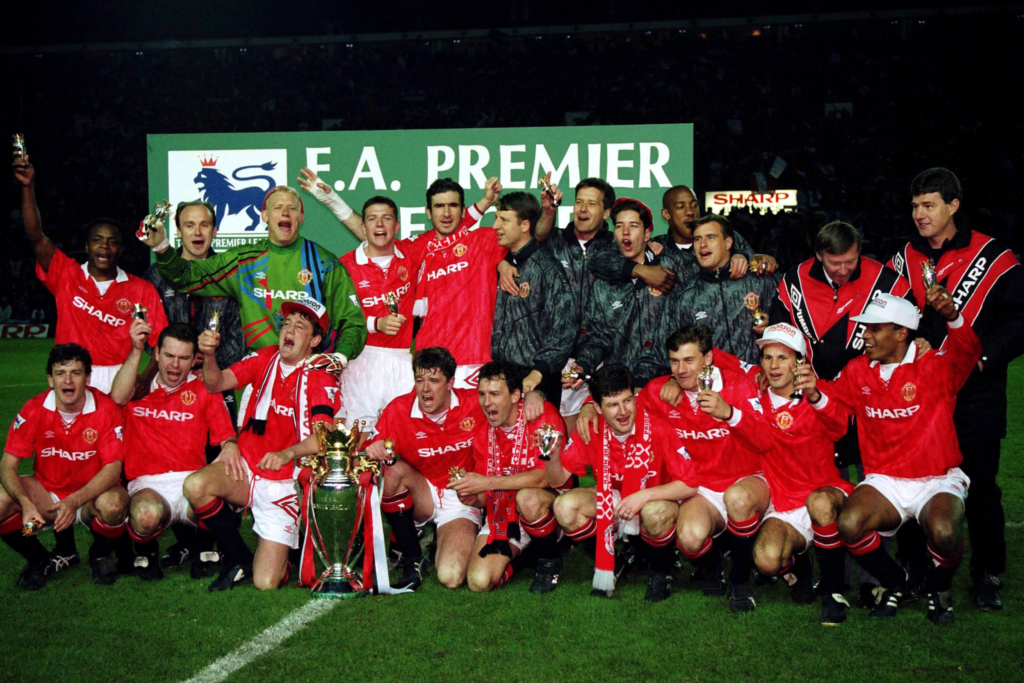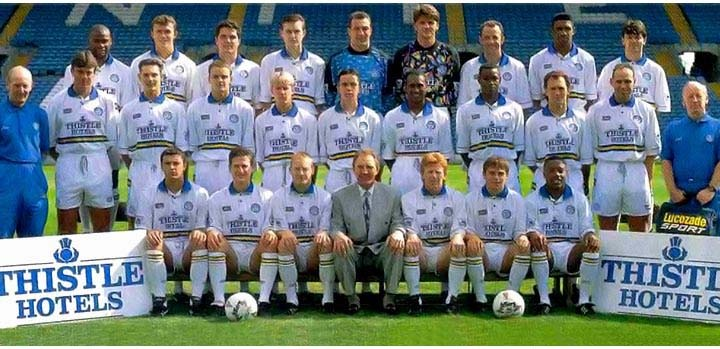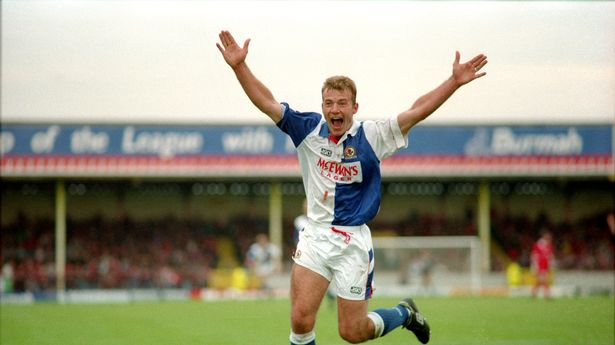Newcomers to the English game are often surprised to learn that the Premier League has only been around since the early 90s. The first ever Premier League season took place in 1992-93 after the (at the time) Big 6 clubs in England pushed for a league to replace the old First Division that would see the clubs in the top flight able to negotiate their sponsorship packages and TV deals, generating vastly more revenue than the clubs had been doing previously.
It was fitting then, that one of those Big 6, which consisted of Arsenal, Everton, Liverpool, Manchester United, and Tottenham Hotspur, would go on to win the inaugural Premier League trophy.
Who won the first-ever Premier League title? Manchester United won the first-ever Premier League title at the end of the 1992-93 season. The Red Devils finished the year as convincing champions, beating Aston Villa to the trophy by ten points. Five of the Big 6 clubs that had pushed for the Premier League to be created, finished in the top ten, with Everton in 13th, the one outlier. It could have been a better season for Crystal Palace, Middlesbrough, and Nottingham Forest, with the three clubs being the first to be relegated from the Premier League back into the Football League.

Here is a look at the title race from that first-ever Premier League season.
Manchester United (Champions)
United had previous entering the first-ever Premier League season. They had finished second in the league in the final season of the First Division, being neck and neck with Leeds United with three games to go before losing two of their final three fixtures.
Their title drought was 25 years entering the season, but the emergence of Ryan Giggs the previous campaign, along with astute signings including the legendary Peter Schmeichel in recent years, had United poised for another run at the title. The final piece was seen as a striker, with Sir Alex Ferguson adding Dion Dublin to his squad from Cambridge United just before the season began. Dublin was hit or miss at Old Trafford, but a November signing from Leeds would change the course of both clubs from that moment on.
Mercurial Frenchman Eric Cantona fell out with Leeds’ boss Howard Wilkinson after he was dropped from a game against Arsenal after a string of unconvincing performances. Famous for his short fuse, this was the final straw for Cantona after a rocky start to the season for Leeds, and he handed in a transfer request. That request was granted, and he was sold to the Red Devils in an astonishing move in hindsight. Cantona became an icon at United, scoring 64 goals in 143 appearances and helping United become a global brand with his flair and creativity.
United lost the first two games of the season to Sheffield United and Everton, with Brian Deane scoring the first-ever Premier League goal in the first of those games. A run of draws through October and a couple more defeats had them 10th in the league just before the signing of Cantona, but they would only lose two more matches over the course of the rest of the season behind the goal-scoring form of Mark Hughes, who finished the season with 15 Premier League goals.
Manchester United 1992-93 Squad
- Peter Schmeichel
- Ryan Giggs
- Bryan Robson
- Eric Cantona
- Mark Hughes
- Steve Bruce
- Paul Ince
- Brian McClair
- Paul Parker
- Russell Beardsmore
- Clayton Blackmore
- Ben Thornley
- Lee Sharpe
- Mike Phelan
- Darren Ferguson
- Danny Wallace
- Dion Dublin
- Simon Davies
- Giuliano Maiorana
- Lee Martin
Key Staff
- Manager: Alex Ferguson
- Assistant Manager: Brian Kidd
- Chairman: Martin Edwards
Leeds United (17th)
Leeds United’s fall from grace was hard. Their 17th-placed finish remains the lowest for any team the season immediately following winning the English title. It was the worst attempt to defend a title in the top division of English football by final league position since Ipswich Town finished the 1962-63 First Division season in 17th place, having claimed the title the season prior.

Their away form was a disaster as they failed to win a Premier League game away from Elland Road all season. The Premier League had 22 teams in its first season, so Leeds finished three places above the relegation zone. They did, however, only beat the drop by two points with a run of just four points from a possible 18 at the end of the season, almost condemning them to the Second Division.
Aston Villa (2nd)
Aston Villa fans will tell you they should have won the first-ever Premier League season. They were top of the league with just six games to play but fell apart at crunch time as Manchester United ran away as champions by ten points. Three defeats in a row to end the season at the hands of Blackburn Rovers, Oldham Athletic, and QPR were the end of the Villains’ chances to win the league. It was the closest they have come to a Premier League win.
Blackburn Rovers (4th)
It is worth noting how Blackburn Rovers did this season, as it was the year before they won their first (and only) Premier League title. Blackburn was the first club to have an owner willing to spend everything on his club. The millions of Jack Walker allowed Blackburn to break the British transfer record when buying Alan Shearer from Southampton before the 1992-93 campaign. Rovers would have been a real threat to win the title if it hadn’t been for Shearer tearing his ACL in December, an injury that limited him to just 21 appearances (in which he scored an astonishing 16 goals).

Spurs/Man City/Arsenal/Chelsea (8th-11th)
There’s not much to say here, but it is interesting to note where these future Top 6 stalwarts finished at the end of the first Premier League season. This put them all behind QPR (fifth) and Sheffield Wednesday (seventh). Liverpool fared better, ending the season in sixth place.
Nottingham Forest (22nd)
The first team to finish a season bottom of the Premier League was former European Cup winners (now the Champions League) Nottingham Forest. Forest started the season with a 1-0 win thanks to a Teddy Sheringham goal against Liverpool, but Sheringham was soon sold to Spurs, and a run of six defeats in a row after that opening-day win left them with a mountain to climb. Without Sheringham and Des Walker (Sampdoria), Forest couldn’t score enough goals and was vulnerable at the back.
The Forest squad was notable for containing a young Irish midfielder named Roy Keane, who would play 41 times for the club that season and was so good that he was named to the PFA Team of the Year despite Forest getting relegated. Keane, of course, was sold to Manchester United, where he would become a club legend under Ferguson and help lead the Red Devils to continual domestic and European glory.
